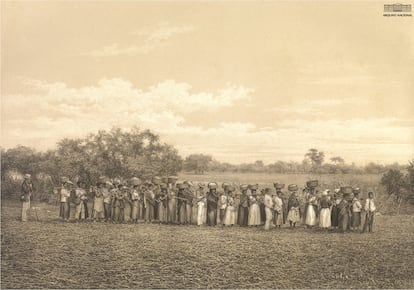Bank of Brazil apologizes for its complicity in the slave trade
The move from the institution, founded 170 years ago, was in response to a call from a group of historians who urged the Public Prosecutor’s Office to open an investigation into its ties with slavery


In Rio de Janeiro — one of the main slave ports in the Americas — four out of every 10 people in the city were slaves in the mid-19th century. Five million Africans built the foundations of the Brazilian economy over nearly four centuries of forced labor. Now, Banco do Brazil (Bank of Brazil), the country’s oldest financial institution, has apologized to Black Brazilians for their complicity in the slave trade and slavery. It issued the apology on the eve of Black Consciousness Day, which is celebrated on November 20, and against the backdrop of the growing debate on how to address the enormous legacy of inequality that slavery left in Brazilian society. The descendants of slaves live shorter lives, get sick more often, have worse jobs and are poorer than their white compatriots.
The Bank of Brazil apologized with a carefully measured statement — the kind law firms draw up to protect companies from litigation. “Today’s Bank of Brazil apologizes to the Black community for its predecessor versions and works intensely to confront structural racism […] in a society that bears the consequences of slavery, regardless of whether or not there is any connection, even if indirect, between the activities of previous versions [of the company] and the slavers of the 19th century,” said the text, released on a Saturday. It was signed by the president of the Bank of Brazil, Tarciana Medeiros, the first Black woman to head the entity, and the first Brazilian on the Forbes list of the 100 most powerful women in the world.
Founded in 1853 by Emperor Pedro II, the Bank of Brazil is the fourth-largest savings entity in the country, and a very well-known brand. The government owns 70% of the shares, it has 75 million clients (a third of the population) and it has branches in almost every corner of the country.
The decision to issue an apology did not come out of the blue, but was rather in response to a skillful move by a group of 14 historians specialized in the slavery business. With the goal of opening a public debate, the historians chose to ask the Bank of Brazil to account for its role in the slave trade, as it is one of the few institutions of the time that is still going. It just celebrated its 170th anniversary. The group called on the Public Prosecutor’s Office, which also exercises the functions of ombudsman, to take action. It immediately opened a case and ordered the Bank of Brazil to respond.

One of the academics in that group, historian Martha Abreu, from the Fluminense Federal University, said she was very pleased with the outcome: “Every reparation policy has to begin with recognition. And the bank was central to the financing of the slave trade,” she told EL PAÍS by phone from Río. The slave trader José Bernardino de Sá, who sold some 200,000 people, became the bank’s main private shareholder in 1853. “There were others, but he was the most powerful,” she explained.
The idea to go to the Public Prosecutor’s Office was born out of frustration. “No one reads our articles. We always felt that our work had little impact on society. We thought that, with the Public Prosecutor’s Office, we would have more strength and visibility. The bank made a move!” she said. The Bank of Brazil will also begin a mentoring program for 150 Black and mixed-race employees to help them reach leadership positions. The goal is for this group to make up 30% of management by 2025; they currently only account for 23%.
For the Public Prosecutor’s Office, the apology and the bank’s other measures are welcome, but do not go far enough. They have opened a public consultation to request reparation proposals that the bank could adopt.

On the Saturday that the written apology was issued, a second, highly symbolic ceremony took place at the Portela samba school in Río. The bank’s head of institutional relations met with several representatives of the Black movement to ask for their forgiveness in person. It was an extraordinary face-to-face meeting with an institution that profited from the sale and purchase of half of Brazil’s ancestors.
The venue chosen for the event also caught attention. Brazil proudly exported samba to the world in the 20th century, but the dance was criminalized after the abolition of slavery in 1888, along with other cultural expressions that the enslaved brought from Africa such as capoeira. The Public Prosecutor’s Office believes that samba schools are key to raising awareness among Afro-Brazilians of their rights. The Portela samba school is a century-old institution, and choosing that setting was also a solemn recognition of the cultural legacy of Afro-Brazilians.
Among those present at the event was Junio Araújo, one of the prosecutors handling the case. He described the ceremony as “historic and a great success,” saying that the hope it instilled was “very exciting and gratifying.” It is now time for the next chapter: reparations.
Sign up for our weekly newsletter to get more English-language news coverage from EL PAÍS USA Edition
Tu suscripción se está usando en otro dispositivo
¿Quieres añadir otro usuario a tu suscripción?
Si continúas leyendo en este dispositivo, no se podrá leer en el otro.
FlechaTu suscripción se está usando en otro dispositivo y solo puedes acceder a EL PAÍS desde un dispositivo a la vez.
Si quieres compartir tu cuenta, cambia tu suscripción a la modalidad Premium, así podrás añadir otro usuario. Cada uno accederá con su propia cuenta de email, lo que os permitirá personalizar vuestra experiencia en EL PAÍS.
¿Tienes una suscripción de empresa? Accede aquí para contratar más cuentas.
En el caso de no saber quién está usando tu cuenta, te recomendamos cambiar tu contraseña aquí.
Si decides continuar compartiendo tu cuenta, este mensaje se mostrará en tu dispositivo y en el de la otra persona que está usando tu cuenta de forma indefinida, afectando a tu experiencia de lectura. Puedes consultar aquí los términos y condiciones de la suscripción digital.








































